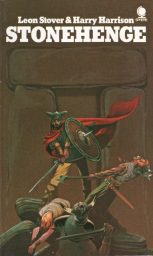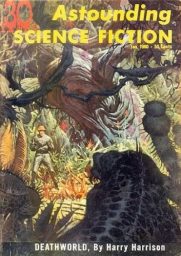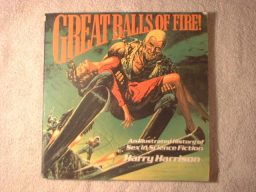 Harry Harrison (1925-2012, born Henry Maxwell Dempsey) started out in illustration in 1946. He started selling fiction in 1950. He had been an editor for brief stints for some science fiction magazines.
Harry Harrison (1925-2012, born Henry Maxwell Dempsey) started out in illustration in 1946. He started selling fiction in 1950. He had been an editor for brief stints for some science fiction magazines.
He is possibly best remembered for the “Stainless Steel Rat” with a criminal turned lawman series. The entry on Harrison in John Clute’s Encyclopedia of Science Fiction describes him as “a vigorous writer of intelligent action adventures in the planetary romance mode” in the wake of Death World (1961).
He had written his own take on sword-and-sorcery fiction, Stonehenge: Where Atlantis Fell (co-written with Leon Stover). Stonehenge is a great book though I wonder if it is due more to Leon Stover than Harry Harrison.
Harrison had this to say in the pages of Amra #36 (1965):
“The leading writers of what could be referred to as first generation sword-&-sorcery are undoubtedly Robert E. Howard and Edgar Rice Burroughs. Merritt perhaps; and Otis A. Kline ought to be called first generation once removed, since he was an out-and-out imitator, not an originator. Probably the best writers of second generation swordplay-&-sorcery were Leiber, Pratt, and de Camp. They raised the level of writing—excruciatingly bad up until then—added a touch of logic and reality to the unreality, and generally brought the category of sword-&-sorcery a step along the road of progress.”
This was part of a long review and demolition of Lin Carter’s The Wizard of Lemuria.
Harrison briefly edited Fantastic Stories in 1968 and wrote an editorial called “Sword and Sorcery- Or Sword and Science?” where he discussed a large middle ground between pure fantasy and hard science fiction. Harrison compares three action sequences the first as sword- and-planet, the second as space opera, and the third as sword-and-sorcery by making minor changes to each sequence.
and-planet, the second as space opera, and the third as sword-and-sorcery by making minor changes to each sequence.
Harrison attempted to write a book about sex in science fiction called Great Balls of Fire (1977). The book was wonderfully illustrated but the text is a hopeless mess. In a chapter entitled “Is Conan Dating Clark Kent?” Harrison makes a colossal blunder in this book by attributing this passage by Jan Strnad to Frederic Wertham, M.D.:
“Conan’s broadsword and double bladed battle-axe are standard phallic symbols; they are of course representative of Conan’s attempts at sublimation of his homosexual tendencies.”
Harrison jumps in with:
“Conan is a crypto-homosexual and the entire school of sword-and-sorcery reflects this fact.”
Harrison better check his facts because Frederic Wertham actually wrote this in response in Amra #58 (1973) to an essay “The Psychological Conan” (Amra #57) by Jan Strnad:
“May I say a few words in Amra in defense of Conan? The article ‘The Psychological Conan’ in v2#57 reduces Conan to a composite cliché of Freudian terminology. That is not the image Howard created and thousands of readers enjoy. The real Conan is anything but that. He cannot be reduced to such a lifeless formula…Psychoanalysis of living people and of literary figures requires not the labeling with Freudian terms but an interpretation based on concrete data. This article represents a misunderstanding of both psychonalysis and Conan. Howard and Conan deserve better.”
I don’t know who or what is responsible for the misquoting of Federic Wertham, M.D. but that is a big scew-up.
The whole “Conan is a crypto-homosexual and the entire school of sword-and-sorcery reflects this fact” line is a keeper. It is laughable today and was in 1977.
The Encyclopedia of Science Fiction has this to say about Harrison:
“Harrison was always hard to pin down. He seemed to have lived everywhere. He was an author of the hardest of hard-sf adventure novels while at the same time a merciless spoofer of the conventions – and politics – of that literature. Throughout his long career, he was both deeply American and deeply expatriate.”
I have not read a lot of Harrison. I read the first book in his Eden series. It was an interesting idea but not-convincing science with dinosaurs continuing to exist on one continent and mankind and advanced mammals separately evolving on another. I read the first in his Hammer and Cross series. Again, I thought the idea was interesting but the direction it went was not convincing alternate history for me.
Harrison was a proto-SJW and a would-be thought policeman. His response to Jerry Pournelle’s successful debut of THERE WILL BE WAR was to put together a counter-anthology called THERE WON’T BE WAR, which was published by Tor Books in 1991 and promptly vanished from sight.
He was, in short, an incompetent, unoriginal, leftist prick. And, I should note, THE STAINLESS STEEL RAT series sucked.
re: It is laughable today and was in 1977.
Sadly, it is exactly the sort of thing you’d expect from a current day critic too.
-
This is up there as the most absurd of these “analyses” that I can recall reading.
Can only imagine the kind of worldview that would allow someone to write a line like that in good faith.
-
It’s a thing of beauty in its idiocy. No, really. You can say that most stabbing and slashing weapons are phallic symbols due to shape and, you know, penetration, as well as clubs and staves and hammers. And firearms, obviously. And all action involving any of those is expression of character’s and writer’s hidden, frustrated homosexual tendencies.
There is a reason why sociology and pop culture still worship Freud when serious psychologists mostly gave up on his BS ages ago.
-
Anthony Burgess made negative remarks about Harrison, especially as regards Make Room! Make Room! copying The Wanting Seed. I found most of Harrison dull except for one story, The Ethical Enginneers, retitled Deathworld 2, which was A strong influence on me. I think I was 14 when I first read it.
I’ve read the original Stainless Steel Rat aeons ago, but I remember it being quick, simple fun with likeable Han Solo-ish protagonist.
Tho, I was young and easily amused.
That said, his criticism and analysis sound like usual cancerous crap.
I am kinda amused that battleaxe line, tho. Projection is almost leaking from it.
STONEHENGE: WHERE ATLANTIS DIED is worth reading and an odd outlier from the rest of Harrison’s fiction. His “Hammer and Cross” stuff is full of silliness.
I liked his Alt-History Stars and Stripes series.
-
I did too, although in retrospect they were sort of preposterous.
I especially liked the second book, with the combined Union/Confederate armies leading the liberation of Ireland from Perfidious Albion.
-
I read some of that series myself, along with his Hammer and Cross, and ‘The Technicolor Time Machine’. The latter was at least funny, but the two series? Ugh.
-
They raised the level of writing—excruciatingly bad up until then…
They raised the level of writing—excruciatingly bad up until then…
They raised the level of writing—excruciatingly bad up until then…
:earthquake:
-
I am not sure if I more offended by that notion itself or by him placing Pratt and de Camp (!!!) right alongside Leiber!
-
I tried reading “The Hammer & The Cross” but quit after a couple chapters. It was written in a bland, mundane, modern style which I find intolerable in fantasy. Give me excruciatingly bad purple prose any day!
“Stonehenge” sounds cool, I’ll check that out.
Isn’t it odd how some people can simultaneously claim that Pulp reduces women to sex objects and that classic Pulp characters are secretly homosexual?
Not to mention simultaneously claiming that Pulp suffers from homophobia and using homosexual as an insult?
If Conan were homosexual (and I, for one, don’t get that vibe from the character at all) shouldn’t that be a mark in Pulp’s favor?
-
It is amusing to see the exact same tactic used to demolish writers of a long ago era. Every single time, the writer in question has some Freudian issue that explains why the writing can be seen as “problematic” and bad. Like big heroic fantasy? Too bad, most of the writers were closet gays. Like hard SF of the 40’s and 50’s? Again too bad, the were all repressed deviants who were fascists as well. It’s like they can’t just say they don’t like the stuff, they have to be sure you know it’s wrong for you to like it too.
-
What you said, Chris. It’s a simple case of using any means necessary to destroy an “enemy”, even if some methods contradict each other.
-
I can’t say I’ve ever read of his books, although I’ve been curious about Deathworld on occasion. I mostly know him as one of the EC sci-fi artists. He wasn’t quite as good as the best artists they had, but his drawings were fine.
-
I liked Deathworld a lot, but the sequels weren’t really up to par, mostly just adventures of the Deathworld folks on less dangerous planets. The hell dimension with a race of super-warriors that have adapted for it is one of my favorite underutilized settings.
It’s more than mildly interesting that Wertham was something of a serious Conan fan. Serious enough to go to bat for Conan/REH in the one fanzine (mostly) devoted to Howard and his creations.
-
Everyone goes after Wertham for what he did to the comics industry in the 50s (for good reason, IMO), but from what I’ve read it seems he mellowed out in a big way in the following decades.
